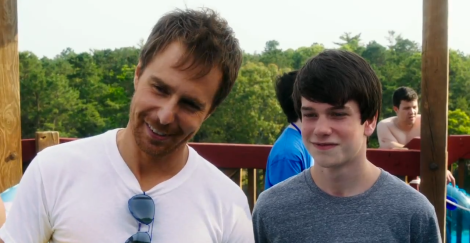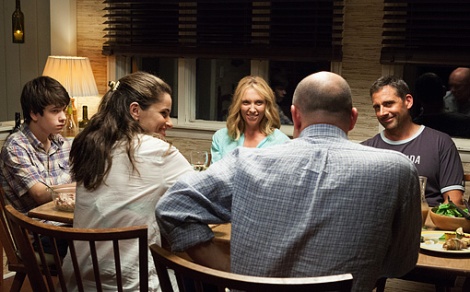His Only Home is the Water Park
The Way, Way Back begins in the way, way back of a station wagon, in the rear facing third row of seats. There sits Duncan (Liam James) staring out of the back window with a static frown while necessarily positioned the opposite way driving is his mother Pam’s (Toni Collette) boyfriend Trent (Steve Carell). It’s just a small metaphor for the increasingly disparate relationship that grows between the boy and man (you decide which is which) in the coming weeks. On a scale of one to ten, Trent tells 14-year-old Duncan he’s a three. Let the summer begin.
They’re driving to Trent’s summer house on the beach, his yearly vacation getaway that for the first time will be spent with Pam, along with Duncan and Trent’s daughter Steph (Zoe Levin). Carrell plays a selfish, sometimes-sinister version of himself, a surrogate father who takes advantage of Duncan’s low self-esteem by trampling over his insecurities in cynical brusque fashion. Pam appears to be in love but rarely stands up for her son, hoping that the two people in her life can mesh together just by co-habitating in a new environment.
Trent’s beach house is called “Riptide,” which I’m sure Duncan would call an accurate description as he frequently gets pulled under the wave of painfully isolating double date dinners with the neighbors (Rob Corrdry and Amanda Peet). Next door is not much help either thanks to a boisterously boozy Allison Janney chattering about cocktails while pushing her younger son Neil (Adam Riegler) into play dates with him. Its her daughter Susanna (AnnaSophia Robb) that catches Duncan’s attention as she slowly drifts out of her snobby group of friends. “It’s like spring break for adults,” she posits among their parents’ campfire giggling. In all that charming adolescent awkwardness, an easily spotted romance begins to kindle.
Written and directed by Jim Rash and Nat Faxon, The Way, Way Back is both an authentic recollection of their childhood and a coming-of-age meditation on summers at the beach. The boardwalks, barbecues, arcades, and pizza shops become the emblems of the insular community that can at once feel so vibrant and encroachingly monotonous. The latter haunts Duncan but he finds an old pink bike that allows him exile, which is slowly nurtured by Owen (A wonderful Sam Rockwell), a wistful slacker and sly, charming owner of a nearby water park. Like Bill Murray in Meatballs, the role he based his character off, Owen is the best friend Duncan has never had, a more capable father who sees the good and potential in people.
In this case, it means offering a daily job at “Water Wizz” to Duncan, who finds temporary ecstasy away from the cramped uncomforting dynamic at the beach home. Its here where the film jumps into its most pleasurable, if not campy, moments, following around Duncan as he supervises water slides, lifeguards, and dances his way into authority quite literally. These are enhanced by the sarcastic and good-natured musings of Owen and other employees, including a heartfelt and sobering performance from Maya Rudolph, providing depth to a shoestring role.
Rash and Faxon both earned Oscars for their screenwriting credits in The Descendants, and here again they revel in family dysfunction and single parenthood. Much like the struggles George Clooney faced with his reluctant daughters in that film, so plays out a similar dynamic between James and Collette, a pairing ostensibly warm but underneath still bitter with regrets. It’s the kind of relationship you wish you could just shake some sense into, or better, slap, which her boyfriend Trent deserves a few times. Duncan’s father is away, and so his shy, often mute nature can be treated like a burden or a challenge by the gossipy town. It’s tempting but difficult to laugh at his flirting misfires or unpolished jokes because deep down you’re pulling for his underdog nature to surprise and overcome.
He reminded me of the character “Smalls” from the cult baseball classic The Sandlot, a quintessential slice of Americana: summer in the suburbs. Smalls’ slow awkward beginnings with his baseball brethren are all the more sentimental and rewarding once he proves himself with the glove, and soon becomes just one of the guys in the field. Duncan’s transition from “Riptide” isolation into waterpark coalescence feels nicely and predictably satisfying in the same way.
This is a summer film not in the pyro-technic, 3-D sense, but in the seasonal sense. Like sharing three hot months on the dusty diamond or a camp lake, the beach town waterpark has a nostalgic, youthful glow. It’ made of memories and also promotes them too (you’ll never forget your first waterslide). Owen seems to be living cathartically through Duncan with every baptismal chlorine splash, but as it normally goes in these situations, Duncan teaches Owen something too. By the time this July delight finishes, you want to give Rockwell a bear hug, jump in the pool, and make up for any lost summertime while you still can.
3.5/5



Good review Jake. It’s one of those movies you want to hate because it’s so obvious and conventional, but yet again, you can’t help but love when you actually start to get to watching it.
Thanks, man. Yeah it’s one of those good summer films you can watch over and over again even in its predictable plot. Nice Fruitvale review. Doing that one for next week.
Pingback: The Movie Date: The Way Way Back | The Reading Date·
Pingback: The Way Way Back; A Few Thoughts | woosworld·
Pingback: The Way Way Back | Mixed Media·
Pingback: The Way Way Back | Ruined for Life: Phoenix Edition·